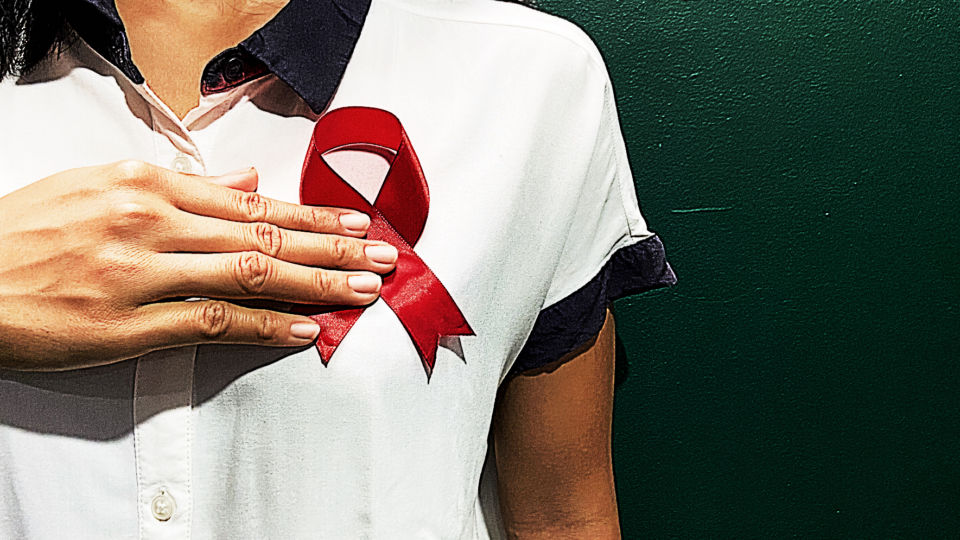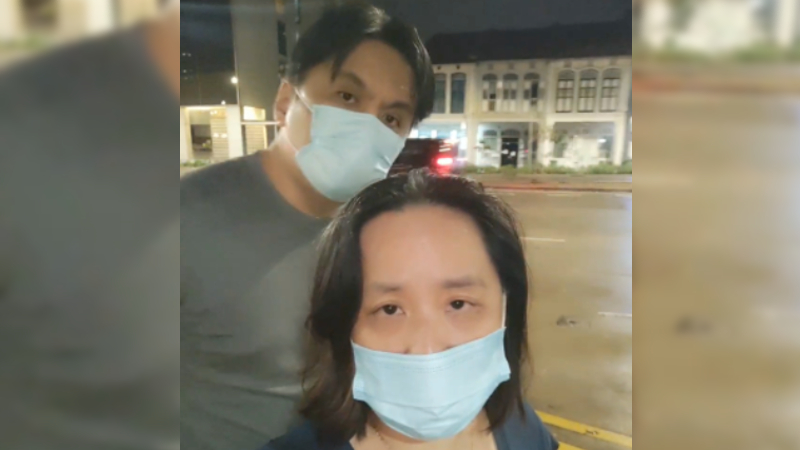“You are unfit to work,” an employment agency staff member told Nining Ivana.
There was no other explanation. At that moment, the then-22-year-old only knew one thing was certain: her window of opportunity for a better life in Malaysia slammed shut.
But Nining didn’t know exactly what was wrong with her before she paid for her own medical check-up. That was when she tested positive for HIV.
“The explanation was not very good at the time. The doctor did not know about HIV treatment, so I was advised to take alternative medicine. Therefore, after that, I did not immediately access treatment for HIV,” Nining told Coconuts.
The HIV diagnosis quashed all her dreams of returning to Malaysia and the chance at a large income as a migrant worker – at least compared to doing the same job in Indonesia. Malaysia, after all, restricts HIV-positive migrant workers from entering the country.
“I was sad, disappointed. I felt worthless. I had a dream to work there again. Furthermore, I lived it and already knew the situation. But all of a sudden, I felt like I lost everything,” Nining said.
Nining first landed in Malaysia for work back in 2003, when she was employed at a latex glove production factory for about a year. She returned to Indonesia for about six months as her health deteriorated, hoping that being with her family could help her recover faster.
When she eventually did, she found a renewed verve for working in Malaysia. But first, she had to clear several hurdles in the form of administrative requirements.
Migrant workers must undergo a medical examination to work in Malaysia. While Nining had gone through it once before, she wasn’t familiar with the details of the check-up itself.
Mandatory tests discriminate against people with HIV, making it seem as if we do not have the right to get a job.
Nining Ivana
On the day that changed her life, Nining had waited for her turn along with hundreds of migrant worker applicants. A lab employee asked three women to enter a room, before ordering all of them, including Nining, to take off their clothes. No explanation was given as to why, and the employee went ahead and checked their vitals.
“We were not treated decently. There we were, three of us, in one room, almost naked. Even though all of us were women, I still felt so uncomfortable, like there was no privacy at all,” Nining recalled.
Next, Nining and her group were rushed to enter another room for blood tests.
“Hurry up, go to the next room,” Nining recalled the lab employee rudely ordering them.
“Ideally there should have been a pre-HIV test counseling, either one-by-one or together, but we did not get it,” Nining added. “So there was no explanation for informed consent. We were only asked to sign it immediately.”
It was as if the lab was in a constant rush to get through its figurative conveyor belt of patients.
“Every time they asked us to sign something, we just signed it because it felt like giving a signature was an obligation that you need to do. [Patients were discouraged from asking] any further questions,” said Nining.
But the inhumane treatment at the lab paled in comparison to the dread Nining felt when she received her HIV-positive test result.
“After that, I felt too insecure to apply for a job with a decent salary. I was afraid that I would have to go through a HIV test again,” she said.
So Nining stayed in Indonesia and found work that didn’t require her to disclose her HIV status. As a store employee, she made only a scant portion of what she would have earned as a migrant worker abroad.
Over the years, she managed to confront her fears about her HIV status. Her concerns gradually faded after she came across social service ads related to HIV treatments on TV.
“There was not much information, but the benefits were huge for people who needed to know about HIV treatment, like me,” she said.
That kick-started Nining’s journey towards self-acceptance, from which she was able to draw from her experiences for the good of others. Nining became the local coordinator of the Indonesia Positive Women Network (IPPI), an organization that advocates the rights of women living with HIV, in Jakarta.
“Mandatory tests discriminate against people with HIV, making it seem as if we do not have the right to get a job. People with HIV, if they are getting the ARV treatment, will not infect other people. If we continue to get discrimination due to our HIV status, it means that the country is still violating human rights,” said Nining.
Nining’s personal ordeal happened years ago, but she sees her story playing out in other survivors all too often to this day.
“Hopefully, someone’s eligibility to work will not be determined by their HIV status anymore,” she said.
Discriminatory testing
Popular destinations for Indonesian migrant workers, such as Malaysia, Singapore, and Brunei Darussalam, mandate HIV testing for work eligibility. Some countries, like Taiwan, have removed the requirement.
In practice, a migrant worker’s status often determines how mandatory the testing requirement actually is. Take Suksma Ratri, whose line of work in Malaysia earned her the “expatriate” tag and made her exempt from the test.
“For expatriates, it is up to the institution where they work, whether it is necessary to run an HIV test or not. Coincidentally, at my workplace, I didn’t need to take an HIV test,” said Ratri.
While Malaysian authorities and her workplace were oblivious to this fact, Ratri was well aware of her HIV-positive status before she relocated to the neighboring country. But Ratri found herself without support during her three years of working in Malaysia, as she did not dare access health services related to HIV, and, consequently, did not receive any ARV treatment.
“I was worried that if they found out about my HIV status, they would deport me,” she confessed.
So Ratri maintained a risk-free lifestyle in Malaysia until her eventual return to Indonesia. But she knew of others in the same boat who weren’t so lucky, unable to receive ARV treatment until they were diagnosed with AIDS.
“We need to have a collective understanding from every country. Every country must understand that HIV was not brought just by migrant workers. Even before migrant workers arrive in your country, you already have it,” Ratri stressed.
“Indonesia, as a country that sends many migrant workers abroad, must advocate for the rights of migrant workers with HIV. The government has to stress that migrant workers with HIV are not a threat.
“Although I am not sure that the government will do this. Even in Indonesia, many companies still discriminate against us.”
Migrant workers more vulnerable to HIV
Indonesia affords little protection, education, and access to HIV-related services for its migrant workers, advocacy NGO Migrant Care co-founder Anis Hidayah says. For one, the Indonesian government lacks data on HIV-positive migrant workers.
“The data is important for evidence-based policy-making, for handling migrant workers with positive status, including to ensure access to treatment and jobs for them,” Anis said.
Feeding the flames of prejudice are constant media reports about migrant workers getting infected by HIV, dying from lack of treatment, or getting deported, she added.
At the same time, migrant workers are among the most vulnerable groups to be infected with HIV.
“They are vulnerable at almost all points [in the employment process],” she said.
Anis explained that there have been numerous cases of migrant workers getting infected through sexual violence at the work assignment agency or shelter before their departure abroad. Then, when abroad, they are also vulnerable to HIV, either through unsafe sex or rape.
“Migrant workers, especially domestic workers, are vulnerable to getting raped by their employers. The perpetrator can transmit the virus to the rape victims,” she said.
If migrant workers from above board employment agencies have been infected with HIV, human trafficking victims who are forced into sex work are certainly susceptible as well, as Migrant Care has found in the cases it has handled.
“So there are a lot of doors to getting HIV,” Anis said.
“The government needs to make policies that regulate transmission prevention, strengthen education, and empowerment. They deserve to have a better life, to get access to HIV treatment, to get access to work.”
I was worried that if they found out about my HIV status, they would deport me.
Suksma Ratri
It certainly wouldn’t look good for the government if it was perceived to be neglecting HIV-positive migrant workers. Though the Health Ministry confirmed that it doesn’t have data for this specific group — confirming Migrant Care’s assertion — it does provide facilities for detection of the virus.
“There are clinics for Indonesian migrant workers to access HIV tests,” Health Ministry Direct Infectious Diseases Director Siti Nadia Tarmizi told us, adding that some of them don’t charge migrant workers for the test.
We also asked the Foreign Affairs Ministry on whether there are plans to introduce policies aimed at erasing stigma against HIV-positive Indonesian migrant workers. The ministry’s response was less than reassuring — at least for the time being.
“Representatives of the Republic of Indonesia will assist in fulfilling the labor rights of Indonesian migrant workers according to applicable laws in the local country,” said the Foreign Affairs Ministry’s Director for the Protection of Indonesian Citizens Yudha Nugraha.
Without any concrete action plan, the stigma surrounding HIV will continue to be more threatening towards the livelihoods and rights of Indonesian migrant workers than the virus itself actually poses towards their lives.
For more information on HIV testing and treatments in Indonesia, as well as to help eradicate discrimination against people with the virus, head on over to the official website of the Saya Berani (I am brave) campaign.











